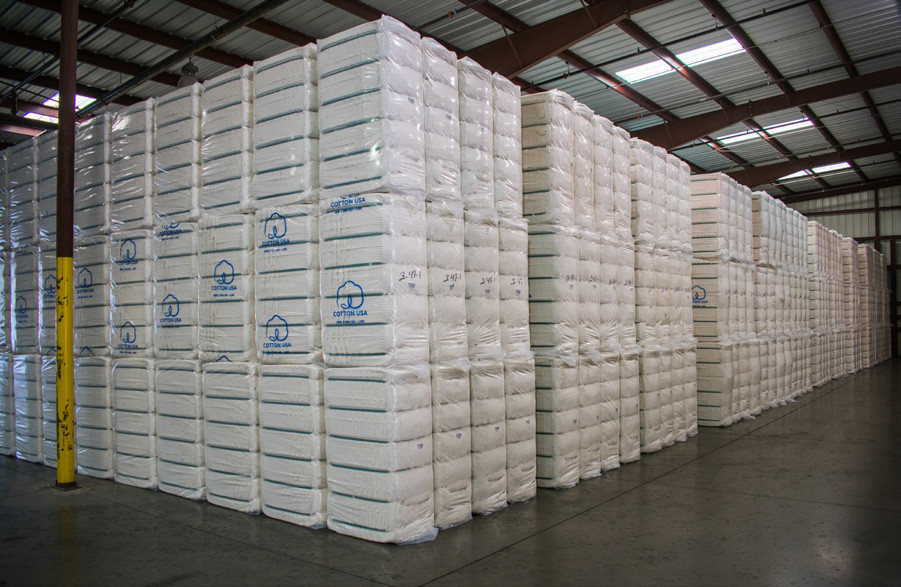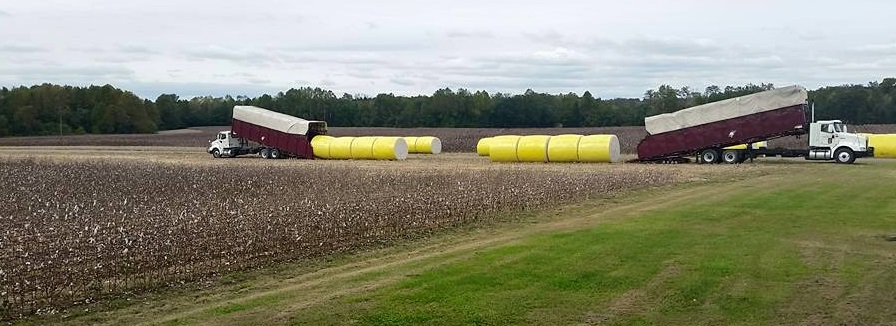Commonwealth Gin
Acres of Cotton Growing in Southeast Virginia
SHARE
In the late 1980s and early 1990s, farmers in southeast Virginia and northeast North Carolina were looking for a crop that would be an alternative to corn. “The soil in these areas was conducive to raising a higher yield of cotton than corn, so there was a resurgence at that time in planting acres of cotton,” says Chris Alphin, president of Commonwealth Gin.
One issue holding back growth in cotton acres was the distance to the nearest gin some 50 miles away. “Back then, growers would pick their cotton crop and then they had to trailer it some distance to get the cotton ginned,” Chris says.
That’s when Chris’s family – his grandparents, father, and uncle – saw an opportunity to provide a gin closer to the concentration of cotton acres. In 1992, they built Commonwealth Gin in Windsor, Virginia. “They built the gin and a small warehouse and after that, cotton acres in the area began to increase. It was more attractive for growers in the area to grow cotton with a gin nearby,” Chris says.
 Stacked bales of finished cotton inside the Commonwealth Gin warehouse.
Stacked bales of finished cotton inside the Commonwealth Gin warehouse.
In 1995, the Alphins built a second gin in Southampton County and eventually added three additional warehouses. “The warehouses give growers an opportunity to store their cotton so they can market it when they are ready to sell it,” Chris says.

Commonwealth Gin provides another benefit for growers. “With the concentration of cotton acres near the gin, that led to growers building big bales of cotton in the field,” Chris says. “We would take trucks that were built especially to haul these big bales, pick them up and bring them to the gin. So, we have essentially taken over most of the transportation needs for our growers.”
Chris joined the family business full-time in 2001 after college, but he had learned the business growing up working summers and afternoons after school. His father, uncle, aunt, and cousin continue to work at the company and his mother retired last summer. During harvest season, which runs from mid-October to mid-December, about 70 people work for Commonwealth Gin. The rest of the year, about 25 employees work on shipping product and maintaining equipment.
Chris describes Commonwealth Gin as a one-stop shop. In addition to ginning, storage, and transportation, the company offers agronomic consulting to growers. “We have staff who specialize in the cultivation of cotton from a scientific perspective – what to plant, when to plant it, when to spray it, and when to pick it.” They also offer a cotton market analyst who provides daily and weekly market consulting exclusively for Commonwealth Gin’s growers. “When they have questions about whether it’s a good time to market and what to expect from the market, we have someone on staff who provides that information. We have grown from a traditional gin that separates the seed from the cotton to offering a lot more services to our customers.”
Commonwealth Gin was a long-time member of Farmers Bank and also worked with a larger bank for some additional needs. “As our business became more complex, the other bank didn’t really understand what we did and why we needed resources,” Chris explains. “We reached out to TowneBank, and they completely, totally, and instantly understood what we needed. About a year later, the merger between Farmers and Towne happened so by default everything came under one roof at Towne.” Commonwealth Gin has enjoyed a longstanding relationship with Manry Rawls Insurance, a 150-year-old agency, which became part of Towne Insurance in 2023. They rely on risk advisor Tim Drake and benefits consultant Kent Rhodes for comprehensive risk management and employee benefits services.
“When we needed it most, TowneBank, and especially Laura Morgan, our banker, really stepped up and made us feel like they had an interest in understanding what we do and providing what we needed. We are very happy with the way things turned out.”
For more information, visit CommonwealthGin.com.
 Module trucks are specially designed to pick up large cotton bales from cotton farms and then transport them to Commonwealth Gin.
Module trucks are specially designed to pick up large cotton bales from cotton farms and then transport them to Commonwealth Gin.
The TowneBank Story
Serving Others. Enriching Lives.
Insights & Perspectives
-
Lansing Building Products—A Business Banking MemberVideosLansing Building Products—A Business Banking Member
-
United Equipment Corporation — A Business Banking MemberGovernment ContractingUnited Equipment Corporation — A Business Banking Member
-
Yard Works — A Business Banking MemberEngineering Construction and DesignYard Works — A Business Banking Member
-
MEB General Contractors—A Business Banking MemberEngineering Construction and DesignMEB General Contractors—A Business Banking Member
